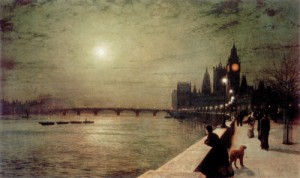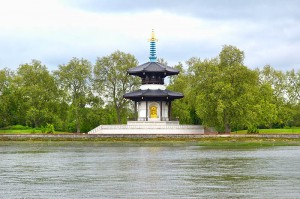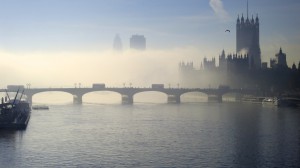Falling Down the Thames Blog 53, 18th March 2015
A Few More Perfect Words About the River Thames
I received some very nice feedback about my recent blog detailing poetry that had been inspired by the River Thames. I was asked for more. Who am I to decline polite requests?
Some pieces have been written by poets in a particularly cheerful mood. In Upon Westminster Bridge, William Wordsworth (1770-1850) wrote:
Never did sun more beautifully steep,
In his first splendour, valley, rock, or hill;
Ne’er saw I, never felt, a calm so deep!
The river glideth at his own sweet will.
William Blake (1757-1827), by way of contrast, must have been having a really dour day when he wrote London:
I wander thro’ each charter’d street,
Near where the charter’d Thames does flow,
And mark in every face I meet,
Marks of weakness, marks of woe.
Another contrasting pair is fronted by the poem Battersea Park by George Barker (1913-1991). Never a chuckle-a-minute sort of fellow, Barker contemplates the way in which “in the fog of failure and distress,” things seen at a glance can:
Makes a man afraid of the ghost of a man…
What I saw was Sorrow loitering along by
The Thames near the tall bridge by Battersea Park.
Compare Barker’s take on life with the rather more up-tempo song entitled Meet me at Battersea Park. Written by Leslie Clark, Joe Henderson and David Valentine, and recorded by Petulia Clark in 1954, we are told:
We’ll stroll along by the riverside,
In sunshine or after it’s dark,
There’s music and dancing, a place for romancing,
So meet me in Battersea Park.
Still on the theme of songs about the River Thames, I have found three additional pieces that commemorate the waterway. Old Father Thames was written by Raymond Wallace and recorded by Peter Dawson in 1933. In what I imagine to be intended as a moral-boosting march for interwar Britain, Wallace wrote:
High in the hills, down in the dales, happy and fancy free,
Old Father Thames keeps rolling along, down to the mighty sea.
To me, The Kinks recording of Waterloo Sunset is the embodiment of mid-1960s popular music. The piece, written in 1967 by Ray Davies, tells of young lovers Terry and Julie who meet each Friday evening at London’s Waterloo Station, and describes the emotions of the person who watches them from a distance. Davies wrote:
Millions of people swarming like flies ’round Waterloo underground,
But Terry and Julie cross over the river,
Where they feel safe and sound.
I suspect that the weekly river crossing was made at Westminster Bridge, after which the couple probably carried on past Big Ben and the Palace of Westminster.
In 2006, Elton John and Bernie Taupin teamed up for the album The Captain and the Kid. Included as a bonus track on the UK edition of the album, the song Across the River Thames addresses issues concerning change and constancy. Music, fashion, hairstyles, and governments all change, but Admiral Nelson remains perched on his monument, Big Ben continues to chime the hour…
And the fog still rolls off the River Thames.
In a few short weeks, Krista and I will paddle the length of the River Thames, from its source near the community of Kemble, and on to the sea. We will be engaged in a landscape that has inspired writers for centuries.
- Glen
Photo credits: “Reflection on the Thames” by John Atkinson Grimshaw – hopeeternal.wordpress.com; Japanese Buddha Peace Pagoda at Battersea Park – www.natureflip.com; fog across the Thames by Westminster Bridge by Derrick J Knight – derrickjknight.com



